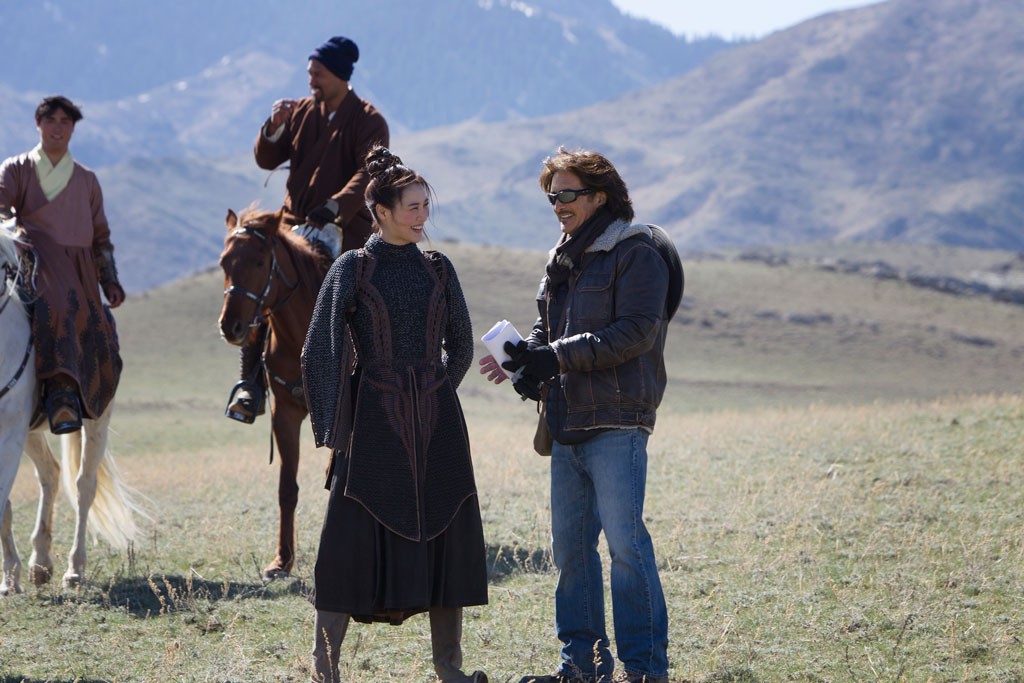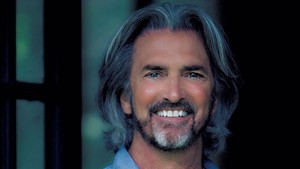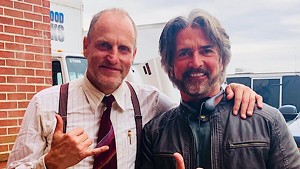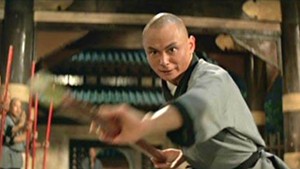
- Courtesy of Phil Bray for Netflix
- Claudia Kim (left) with John Fusco on the set of "Marco Polo"
Screenwriter John Fusco's surname is an anagram of "focus" — an apt coincidence for someone who's been in the movie business for more than 30 years. Back in the 1980s, while still a New York University screenwriting student, Fusco twice won the now-defunct FOCUS (Films of College and University Students) Award. At the 1984 ceremony, where he accepted the award for the screenplay that would become the 1986 film Crossroads, master of ceremonies Rob Reiner commented on the auspicious anagram.
Vermont-based Fusco recently switched his focus to the next wave of film delivery: online streaming. He's the creator and showrunner of Netflix's epic series "Marco Polo." With Bob and Harvey Weinstein, among others, Fusco is also one of the show's executive producers; he was closely involved with its fight choreography and wrote or co-wrote the first season's episodes.
Fusco has apparently found a winning formula, as "Marco Polo" was renewed last month for a second 10-episode season; he just finished writing the pilot. The show is now one of Netflix's tentpoles, as the company continues to develop original programming and upset traditional media distribution. In a recent interview with Seven Days, Fusco couldn't help jesting that the show's global reach evokes Polo's own global expeditions in the late 13th and early 14th centuries.
The first season, which cost a reported $90 million and was shot in the high-resolution 4K format, is a visual feast. Shot in Italy, Malaysia and Kazakhstan, the episodes burst with gorgeous imagery: the throne room of Kublai Khan, expansive steppes, medieval Chinese palaces.
Fusco is currently writing several film projects, but he was especially excited to discuss "Marco Polo," which brings together several of his longstanding interests. In fact, Fusco admitted he identifies with his titular hero, not least because, in researching the show, he traveled some of the very roads on which Polo journeyed.
Fusco lives in Lamoille County on a hill too steep to accommodate a reporter's poky little rental car. When Seven Days visited, he offered hot green tea and a seat in a comfy fireside chair. His writing room — all dark wood, overstuffed bookshelves and historical artifacts — feels like a 19th-century gentleman's parlor. Friends jokingly call him "the Taoist monk on the mountain," Fusco said. It's a sobriquet he relishes. He clearly prizes his time at home, in part because he was far afield for 15 straight months during production of "Marco Polo."
Fusco has an abiding interest in Asian culture. When he was growing up in Connecticut, he related, his father, a Korean War vet, told him about the incredible martial-arts ability of an old man who used to hang around the army base. Fascinated, the boy took up martial arts himself, which led to an interest in Shaolin kung fu and the philosophy that underpins it. Fusco's now proficient in that and jeet kune do, the martial art founded by Bruce Lee.
"I would go off to catechism, sit at the corner bus stop and read the teachings of Lao Tzu," said Fusco. "And then I would go to catechism, and it was just not connecting." He found himself drawn toward Chinese culture more than Christianity. "The astrology, the herbal medicine, elixirs of immortality and the science of qigong — it was all so fascinating to me," Fusco said.
The same was true of Marco Polo. "I loved the idea that there was this young Italian kid who had traveled farther into China than any [westerner] before him," Fusco said. "He went there with some prejudice and was a dyed-in-the-wool Christian, and the experience opened his eyes. He became the first bridge between east and west, and I felt this affinity with this young Italian traveler."
That affinity never disappeared, but it did take a backseat as Fusco's screenwriting career took off in the 1980s. After Crossroads, he penned the neotraditional western Young Guns and its sequel. An avid horseman and founder of a conservancy for rare horse breeds, he also scripted two equine-themed films, Spirit: Stallion of the Cimarron and Hidalgo. More recently, Fusco revisited his passion for martial arts and Chinese history in the screenplay for The Forbidden Kingdom (the first cinematic meeting of martial arts titans Jackie Chan and Jet Li); and in Crouching Tiger, Hidden Dragon: The Green Legend, the forthcoming sequel to the Oscar-winning martial-arts drama.
While Fusco was on location in China for The Forbidden Kingdom, his son reminded him about his longstanding promise of a father-son horseback trek across Mongolia. Realizing there was no better time, the two found a guide and set off. "As my son was having all these conversations with our guide about the Mongol Empire, the name 'Marco Polo' would continue to come up," said Fusco. "And I realized that, in Asia, the jury was never out on the veracity of his accounts, like it is here."
The writer described "a perfect storm" of happenstance: the rekindling of his own fascination with Polo, a producer asking him if he had any material about westerners in China and his own growing interest in writing for television. For Fusco, the story of Polo's travels was a natural for a long-form TV series.
"It's so vast, because he was in China for 17 years. Marco was sent on myriad missions by Kublai Khan, and there's a rich, multicultural world with potential multiple storylines," Fusco explained. Given Polo's death-bed pronouncement that he hadn't recounted half of what he'd seen, Fusco also appreciated his tale's "latitude for creativity," which allowed the story to progress down various "tributaries."
Originally slated to run on the Starz network, "Marco Polo" found a home on Netflix, where it is now viewable in all of North and South America and much of western Europe. And Fusco was right: It's hard not to see parallels between Polo's globe-trotting and the show's hemispheric reach.
The episodes were shot in order, starting in Venice, in the home country of lead actor Lorenzo Richelmy. "This unknown Italian kid who was cast as Marco started in Venice, in his comfort zone, speaking his native tongue," Fusco described. Once the production moved to central Asia, Richelmy's growing astonishment reminded the show's creator of that which Polo himself must have experienced.
The show is notable for its visual beauty, which Fusco said was a consideration right from the start. The idea was to show "this big, sumptuous world of Kublai Khan through the eyes of this Venetian traveler," he said. The show's locations, costumes and textures are appealing in an almost otherworldly way, the better to evoke Polo's astonishment at what he found.
For a large and multifaceted show, "Marco Polo" had a remarkably brief shooting schedule: March to August 2014. By December, all 10 episodes were available online.
But the shoot was not without difficulties. An entire studio was constructed ex nihilo for the production in the jungles of Malaysia — no small feat. Several crew members, as well as Fusco's son, contracted dengue fever and had to be treated in one of three triage wards. And Malaysia's dearth of horses proved tricky for a show set in the equine culture of the Mongol empire. Fusco recounted how one of the show's horse wranglers had to round up "forgotten" and mistreated animals and gradually train them to be camera-ready.
At times, production of the series in central Asia was halted by fierce windstorms that damaged sets and camera equipment. Out on the steppes, the show's caterers occasionally had to butcher sheep to feed cast and crew.
A far more serious setback occurred when the show's assistant martial-arts choreographer, Ju Kun, went down with the rest of the passengers on Malaysia Airlines Flight 370, which crashed in the Indian Ocean. "Our crew was just devastated," recalled Fusco. The series' second episode is dedicated to Ju's memory.
Fusco told a story about the chilly reception that Marco; his father, Niccolò; and his uncle Maffeo received upon returning to Venice after 17 years abroad. As the story goes, he said, "They smelled; they were dressed like Mongols; they'd forgotten how to speak Italian; nobody recognized them."
The writer finds in this tale another parallel between Marco's life and his own. "You go off to make a show like this, and you're in this bubble; it's very unrealistic," he said. "Your world is suspended in this fiction, and the real world doesn't wait for you. People die and life changes."
Indeed, while Fusco was on that 15-month shoot, his old dog went deaf, his most cherished horse had to be put down and, most tragically, his younger brother died unexpectedly. "You come home, and it's like, Hey, wait a minute — what happened? And I felt a little like the Polos," he said.
Fusco's passion for the explorer's story is so strong that he visited the set even during his occasional days off, he recalled. For him, the show doesn't just tell the explorer's story; it's a way to resuscitate Polo's legacy. It's also a deeply personal tale for Fusco. As he put it, "I hit on a story world that speaks to so much of the stuff I love that I could keep doing it and doing it."












Comments
Comments are closed.
From 2014-2020, Seven Days allowed readers to comment on all stories posted on our website. While we've appreciated the suggestions and insights, right now Seven Days is prioritizing our core mission — producing high-quality, responsible local journalism — over moderating online debates between readers.
To criticize, correct or praise our reporting, please send us a letter to the editor or send us a tip. We’ll check it out and report the results.
Online comments may return when we have better tech tools for managing them. Thanks for reading.